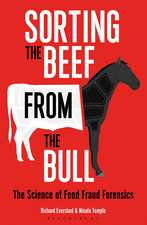Cuban Counterpoint – Tobacco and Sugar
Autor Fernando Ortiz, Harriet De Onísen Limba Engleză Paperback – 21 feb 1995
Ortiz presents his understanding of Cuban history in two complementary sections written in contrasting styles: a playful allegorical tale narrated as a counterpoint between tobacco and sugar and a historical analysis of their development as the central agricultural products of the Cuban economy. Treating tobacco and sugar both as agricultural commodities and as social characters in a historical process, he examines changes in their roles as the result of transculturation. His work shows how transculturation, a critical category Ortiz developed to grasp the complex transformation of cultures brought together in the crucible of colonial and imperial histories, can be used to illuminate not only the history of Cuba, but, more generally, that of America as well.
This new edition includes an introductory essay by Fernando Coronil that provides a contrapuntal reading of the relationship between Ortiz's book and its original introduction by the renowned anthropologist Bronislaw Malinowski. Arguing for a distinction between theory production and canon formation, Coronil demonstrates the value of Ortiz's book for anthropology as well as Cuban, Caribbean, and Latin American studies, and shows Ortiz to be newly relevant to contemporary debates about modernity, postmodernism, and postcoloniality.
Preț: 233.03 lei
Nou
Puncte Express: 350
Preț estimativ în valută:
44.60€ • 46.39$ • 37.38£
44.60€ • 46.39$ • 37.38£
Carte tipărită la comandă
Livrare economică 14-28 martie
Preluare comenzi: 021 569.72.76
Specificații
ISBN-13: 9780822316169
ISBN-10: 0822316161
Pagini: 408
Dimensiuni: 146 x 214 x 29 mm
Greutate: 0.54 kg
Editura: MD – Duke University Press
ISBN-10: 0822316161
Pagini: 408
Dimensiuni: 146 x 214 x 29 mm
Greutate: 0.54 kg
Editura: MD – Duke University Press
Textul de pe ultima copertă
"The first and only comprehensive study of the West Indian people. Ortiz ushered the Caribbean into the thought of the twentieth century and kept it there." --C. L. R. James












